|
For
me, the most important recent stages of human evolution bounce through
the Australopithecines, Homo Habilis, Homo Erectus with some deviation,
such as Homo Heidelbergensis and Homo Neanderthalis, to Homo Sapiens.
Following such a trail there is a regular increase in brain capacity - a
reliable indicator of advancement. That's my thinking, but I'm no
expert. The skull is to my mind the best indicator of development, that
is if I had to choose. But, obviously I'd prefer to see the whole
story.
I
wouldn't want to meet Neanderthal man in a dark alley judging by his
skull - though he may turn out to be a nice bloke if you buy him a cola.
I've seen people alive today who have the heavy bone structure of
Neanderthals. One chap in particular was striking, so much so that I had
difficulty focusing on the conversation. He was physically impressive, friendly
and intelligent - though not so bright as to call him an intellectual.
I
got to wondering about his DNA. What if I could check him out to see
where he came from. Would it be possible to extract the muscle DNA to
turn me into Tarzan. Of course it would be, but not quite yet. The
technology is
there, but! But, would that stop the military? Would it heck, they
are probably working on it right now. So too the rival powers and those
dreaming of world supremacy. It's all very Bourne
Supremacy.
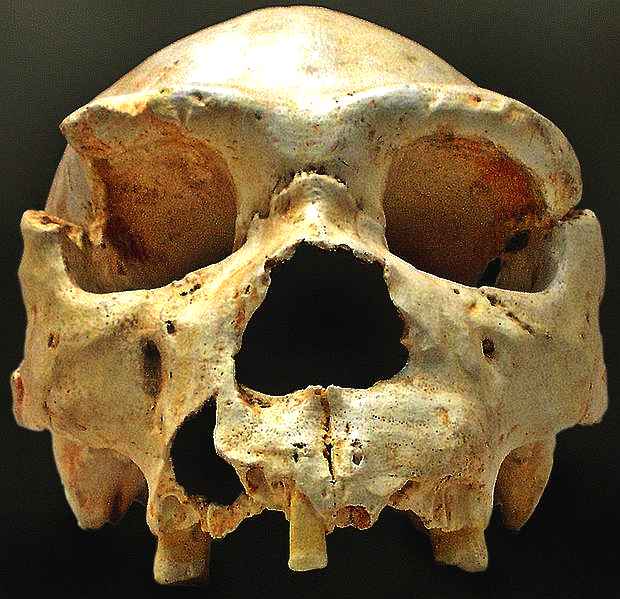
Cranium
of Homo Heidelbergensis
Academically,
anthropology is the study of humanity. It deals with all that is characteristic of the human experience, from physiology and the evolutionary origins to the social and cultural organization of human societies as well as individual and collective forms of human experience. It has origins in the humanities, the natural sciences, and the social
sciences. The term "anthropology" is from the Greek anthrōpos, "man", understood to mean humankind or humanity, and -logia (-λογία), "discourse" or "study."
Anthropology's basic concerns are the definition of human life and origin, how social relations among humans are organized, who the ancestors of modern Homo sapiens are, what the characterizations of human physical traits are, how humans behave, why there are variations among different groups of humans, how the evolutionary past of Homo sapiens has influenced its social organization and culture and so
forth.
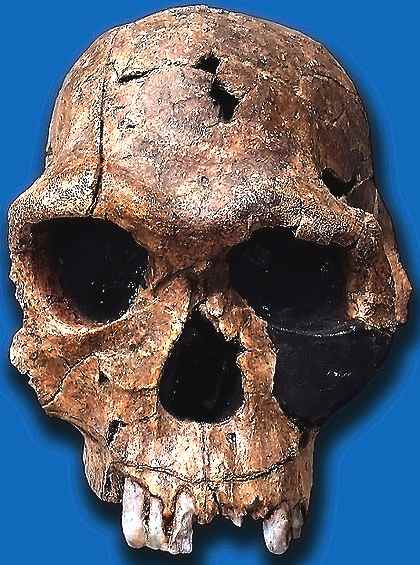
Skull
of Homo Habilis from 1813
Anthropology originated in the colonial encounter between Western people and colonized non-western peoples, as Europeans tried to understand the origins of observable cultural diversity. Today anthropology is a global discipline, and anthropologists study both Western and non-Western societies.
In the United States, where anthropology was first defined as a discipline the field is traditionally divided into four sub-fields: cultural anthropology, archaeology, linguistic anthropology, and biological
anthropology. In Europe the discipline originated as ethnology and was originally defined as the study of social organization in non-state societies, later redefined as social anthropology. Socio-cultural anthropology is considered anthropology proper in most of Europe, and in the parts of the world that were influenced by the European
tradition.
Socio-cultural anthropology has been heavily influenced by structuralist and post-modern theories, as well as a shift toward the analysis of modern societies. During the 1970s and 1990s, there was an epistemological shift away from the positivist traditions that had largely informed the
discipline. During this shift, enduring questions about the nature and production of knowledge came to occupy a central place in cultural and social anthropology. In contrast, archaeology and biological anthropology remained largely positivist. Due to this difference in epistemology, anthropology as a discipline has lacked cohesion over the last several decades.
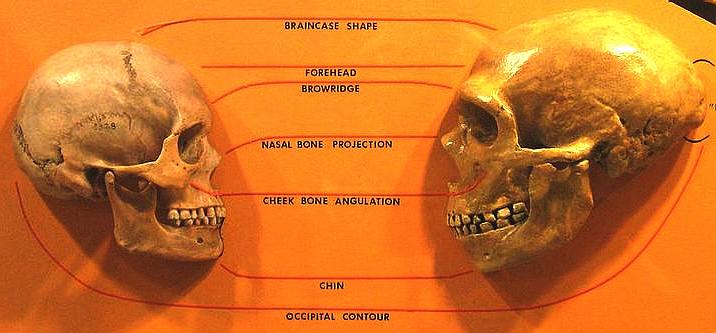
Comparison
of Homo Sapiens and Neanderthal skulls
Military
Anthropologists' involvement with the U.S. government, in particular, has caused bitter controversy within the discipline. Franz Boas publicly objected to US participation in World War I, and after the war he published a brief expose and condemnation of the participation of several American archaeologists in espionage in Mexico under their
cover as
scientists.
But by the 1940s, many of Boas' anthropologist contemporaries were active in the allied war effort against the "Axis" (Nazi Germany, Fascist Italy, and Imperial Japan). Many served in the armed forces, while others worked in intelligence (for example, Office of Strategic Services and the Office of War Information). At the same time, David H. Price's work on American anthropology during the Cold War provides detailed accounts of the pursuit and dismissal of several anthropologists from their jobs for communist sympathies.
Attempts to accuse anthropologists of complicity with the CIA and government intelligence activities during the Vietnam War years have turned up surprisingly little (although anthropologist Hugo Nutini was active in the stillborn Project
Camelot). Many anthropologists (students and teachers) were active in the antiwar movement. Numerous resolutions condemning the war in all its aspects were passed overwhelmingly at the annual meetings of the American Anthropological Association (AAA).
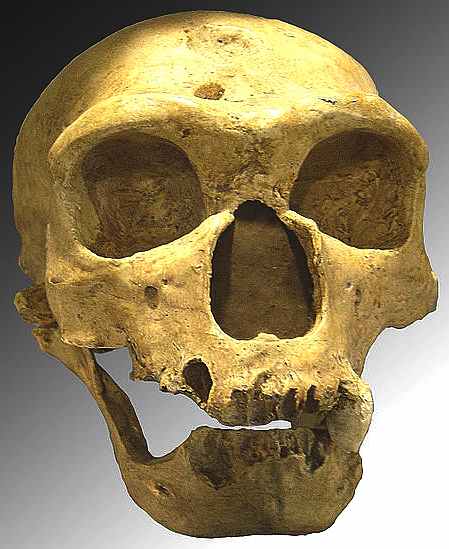
Skull
of homo sapiens neanderthalensis
Professional anthropological bodies often object to the use of anthropology for the benefit of the state. Their codes of ethics or statements may proscribe anthropologists from giving secret briefings. The Association of Social Anthropologists of the UK and Commonwealth (ASA) has called certain scholarship ethically dangerous. The AAA's current 'Statement of Professional Responsibility' clearly states that "in relation with their own government and with host governments ... no secret research, no secret reports or debriefings of any kind should be agreed to or given."
Anthropologists, along with other social scientists, are working with the US military as part of the US Army's strategy in
Afghanistan. The Christian Science Monitor reports that "Counterinsurgency efforts focus on better grasping and meeting local needs" in Afghanistan, under the Human Terrain System (HTS) program; in addition, HTS teams are working with the US military in
Iraq. In 2009, the American Anthropological Association's Commission on the Engagement of Anthropology with the US Security and Intelligence Communities released its final report concluding, in part, that, "When ethnographic investigation is determined by military missions, not subject to external review, where data collection occurs in the context of war, integrated into the goals of counterinsurgency, and in a potentially coercive environment – all characteristic factors of the HTS concept and its application – it can no longer be considered a legitimate professional exercise of anthropology. In summary, while we stress that constructive engagement between anthropology and the military is possible, CEAUSSIC suggests that the AAA emphasize the incompatibility of HTS with disciplinary ethics and practice for job seekers and that it further recognize the problem of allowing HTS to define the meaning of “anthropology” within
DoD."
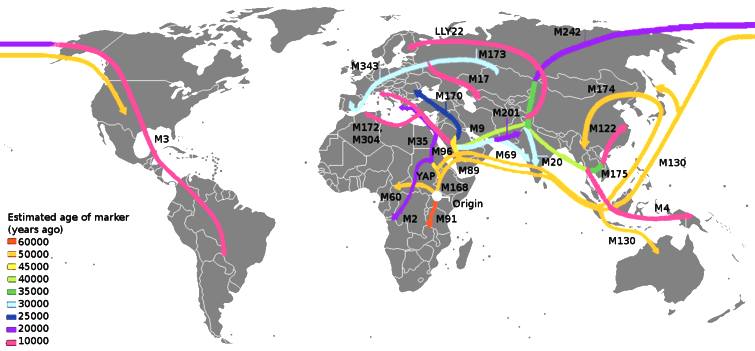
Human
distribution from Tanzania, across the globe
Major
discussions
Focus on other
cultures
Some
auhors argue that anthropology originated and developed as the study of "other cultures", both in terms of
ime (past societies) and space (non-European/non-Western societies). For example, the classic of urban anthropology, Ulf Hannerz in the introduction to his seminal Exploring the City: Inquiries Toward an Urban Anthropology mentions that the "Third World" had habitually received most of attention;
anthropoogists who traditionally specialized in "other cultures" looked for them far away and started to look
"acoss the tracks" only in late 1960s.
Now thee exist many works focusing on peoples and topics very close to the author's
"home". It is also argued tat other fields of study, like History and Sociology, on the contrary focus disproportionately on the
West.
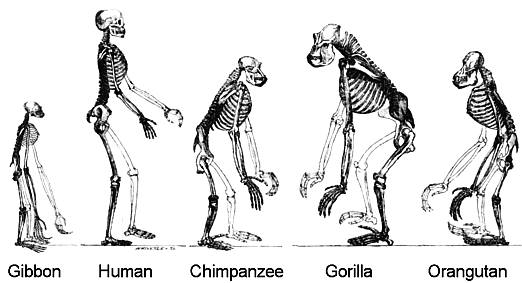
Drawing
showing the basic similarities between Human and Ape skeletons
In Franc, the study of Western societies has been traditionally left to sociologists, but this is increasingly
changing,starting in the 1970s from scholars like Isac Chiva and journals like Terrain ("fieldwork"), and
developig with the center founded by Marc Augé (Le Centre d'anthropologie des mondes contemporains, the
Anthopological Research Center of Contemporary Societies). The same approach of focusing on "modern world" topics by Terrain, was also present in the British Manchester School of the
1950s.
Since the1980s it has become common for social and cultural anthropologists to set ethnographic research in the
Nrth Atlantic region, frequently examining the connections between locations rather than limiting researchto a single locale. There has also been a related shift toward broadening the focus beyond the daily life of ordinary people; increasingly, research is set in settings such as scientific laboratories, social
movemets, governmental and nongovernmental organizations and businesses.
LINKS:
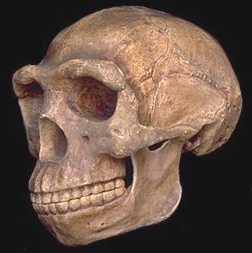
Reconstructed
skull of Peking Man, a representative of the extinct species
believed
to
be the nearest ancestor of Homo sapiens, Homo erectus
Anthropology
| Archaeology | Dinosaurs
| Evolution | Fossils
| Geology | Mammoths
Meteorites | Paleontology
| Plate Tectonics | Neanderthal
Man
HUMANS:
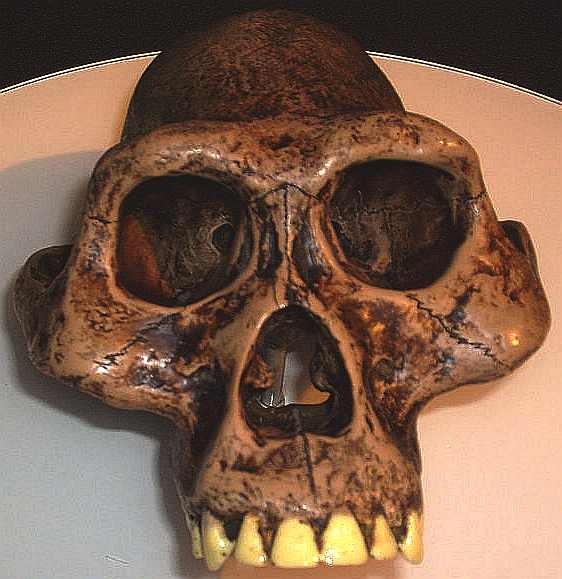
Reconstructed
skull of Australopithecus afarensis
|
Humans
& planet X - Youtube |
Evolution
animation - Youtube |
|
Evolution
of modern humans - Youtube |
The
ape that got lucky - Youtube |

Evolution
accelerated by man an
anthropological anthem by Jameson
Hunter
OTHER
ANIMALS:
|
AMPHIBIANS |
Such
as frogs (class: Amphibia) |
|
ANNELIDS |
As
in Earthworms (phyla: Annelida) |
|
ANTHROPOLOGY |
Neanderthals,
Homo Erectus (Extinct) |
|
ARACHNIDS |
Spiders
(class: Arachnida) |
|
ARTHROPODS |
Crabs,
spiders, insects (phyla: Arthropoda) |
|
BIRDS
|
Such
as Eagles, Albatross
(class: Aves) |
|
CETACEANS
|
such
as Whales
& Dolphins
( order:Cetacea) |
|
CRUSTACEANS |
such
as crabs (subphyla: Crustacea) |
|
DINOSAURS
|
Tyranosaurus
Rex, Brontosaurus (Extinct) |
|
ECHINODERMS |
As
in Starfish (phyla: Echinodermata) |
|
FISH
|
Sharks,
Tuna (group: Pisces) |
|
HUMANS
- MAN |
Homo
Sapiens THE
BRAIN |
|
INSECTS |
Ants,
(subphyla: Uniramia class:
Insecta) |
|
LIFE
ON EARTH
|
Which
includes PLANTS
non- animal life |
|
MAMMALS
|
Warm
blooded animals (class: Mammalia) |
|
MARSUPIALS |
Such
as Kangaroos
(order: Marsupialia) |
|
MOLLUSKS |
Such
as octopus (phyla: Mollusca) |
|
PLANTS |
Trees
- |
|
PRIMATES |
Gorillas,
Chimpanzees
(order: Primates) |
|
REPTILES |
As
in Crocodiles,
Snakes (class: Reptilia) |
|
RODENTS |
such
as Rats, Mice (order: Rodentia) |
|
SIMPLE
LIFE FORMS
|
As
in Amoeba, plankton (phyla: protozoa) |
|
|
The
evolution of refreshment
..
Thirst for Life

Planet
Earth can - the World in Your Hands
|








